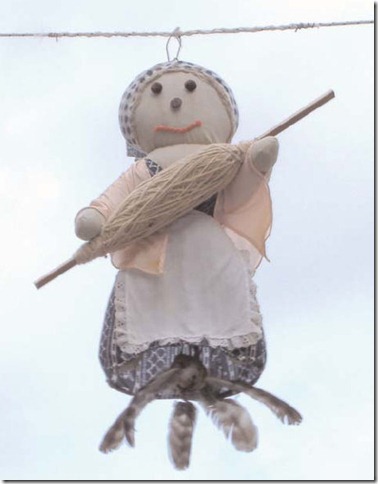La Quaresima Posted by Serena on Mar 21, 2012 in Culture
A few days ago I met my friend Cecilia, an inexhaustible source of Italian traditions who, knowing about my blogging job, stopped me in the street saying: “Tu che sei sempre alla ricerca di tradizioni, me n’è venuta in mente una sulla Quaresima che si usava un tempo dalle mie parti, giù nel Sud Italia” (as you are always trying to find out about traditions, I’ve thought of one related to la Quaresima that we used to do once upon a time where I’m from in the south of Italy).
Quaresima (Lent) is the period in the Catholic calendar that starts on Mercoledì delle Ceneri (Ash Wednesday), which this year falls on the 22nd of February, and ends on Domenica di Pasqua (Easter Sunday), the 8th of April in 2012. It lasts almost 7 weeks, 47 days to be precise, and in fact the name ‘quaresima’ comes from quaranta (forty), the traditional number used since biblical times for a period of penitence or cleansing. The word quarantena (quarantine) also comes from the same root.
Until fairly recently, probably the late Seventies, la Quaresima was a very hard time for Catholic practitioners: they weren’t allowed to eat meat or any other rich food such as oil, butter or eggs. My mother still recalls that every Friday of Quaresima when she was a child they would only eat unleavened wholemeal bread with boiled wild chicory, without any seasoning! At that time, Quaresima also meant abstinence from any pleasure, therefore theatres and cinemas would be closed for the whole period. In fact I remember that when I was a child living in Lucca, the theatrical season used to finish by the end of February before the beginning of Lent. I vividly remember the very first time a play was shown during Lent, especially as I went to see it with my mother. The theatre was half empty, and my mother repeated several times: “Mi fa così strano essere qui a teatro sapendo che siamo in Quaresima” (It feels so strange to be here at the theatre knowing that we are in Quaresima). The play (I can’t remember the title) was very good, and the main actor, Raf Vallone (I still remember him, a famous classic actor) gave a great performance, which made it worthwhile to overcome our sense of guilt!
The tradition recounted to me by Cecilia involves making a ragdoll representation of an old woman called Quaresima, which symbolised, as you may have guessed, la Quaresima. The Quaresima ragdoll would be suspended above the streets or the courtyards with a rope tied from one balcony to another (every group of houses would make its own Quaresima). From its feet hung a potato with seven hen’s feathers stuck in it. The seven feathers represented the seven weeks of Lent, and every Sunday the ragdoll was lowered down and one feather would be removed to count off the weeks. It was a visual reminder of that period of penitence and of its implications. On the fourth week in some places another image of the Quaresima would be sawn in half to symbolise that the period of Lent was half way through, and a small feast would take place to give the penitents a moment of respite.
This tradition, with little variations, was common all over the South of Italy, and is still alive here and there. The name of the ragdoll however, sometime changes slightly from place to place: Curaesëma in Abruzzo, Corajisima in Calabria, Quaremma or Caremma in Puglia, etc.

Build vocabulary, practice pronunciation, and more with Transparent Language Online. Available anytime, anywhere, on any device.





Comments:
Karin marasco:
Thank you for your wonderful articles !
Geoff:
@Karin marasco Salve Karin, non c’è di che!
Serena
joseph:
thanks! it was informative and very e\ntertaining
Doctor Bill:
Mi è piaciuto leggere il tuo articolo interessante su Quaresima.
Ho scritto un’ articolo sulla Quaresima, nel mio sito internet, nella sezione “Salute Spirituale”.
Puo usare l’articolo o un link sul mio sito Web?
Chiedo, scusa per il mio povero italiano; Sto imparando italiano
Geoff:
@Doctor Bill Salve Dr. Bill, ci farebbe piacere se metti un link al nostro blog sul tuo sito.
Non devi chiedere scusa per averci scritto in Italiano, hai fatto bene, continua cosi.
Saluti da Geoff